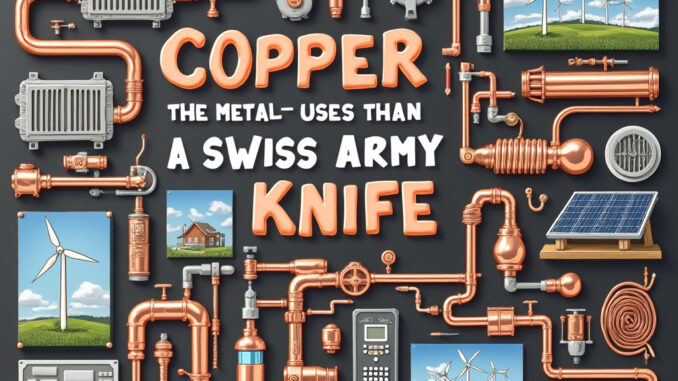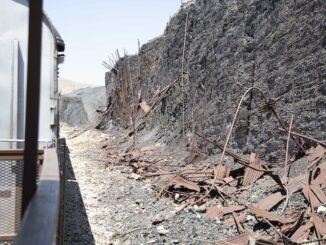
- The West’s green energy transition is heavily reliant on copper, a metal primarily processed in China.
- Building a Western copper processing industry would be costly and time-consuming, potentially hindering the transition.
- Western governments may need to cooperate with China or face significantly higher costs for renewable technologies.
Copper, the key transition metal, hit a price of $11,000 per ton a couple of months ago. Goldman Sachs forecast it could surge all the way to $12,000 as electrification really gets going—because there are not enough copper mines.
Yet, the lack of mining capacity is just one problem for the transition. The other, at least in what is commonly referred to as the collective West, is copper processing capacity. Most of it is in China. Without it, the transition will stumble and possibly collapse.
“No China, no transition,” Wood Mackenzie said in a blunt new report about the global state of copper. The consultancy predicts a 75% increase in the worldwide demand for the metal by 2050, which would naturally necessitate a boost in mining investment. It would also require a boost in refining investment—outside China. And that will cost an estimated $85 billion, according to Wood Mac.
That China dominates virtually every aspect of the transition industrial complex is hardly news. The country is the biggest solar power and wind turbine producer. It is the biggest market—and manufacturer—of electric cars. It has the world’s biggest rare earth refining capacity. China is the transition, in a way. And the rest of the world has been happy to outsource its heavy industries to China until recently. Now, the West has realized it might be a good idea to be more self-sufficient and less reliant on others when it comes to industries dubbed critical, especially if you have certain geopolitical differences with those others.
The problem is that the West is about two decades late to the transition party. Building a copper refining industry from scratch would take time, money, and resources that governments in Europe, the U.S., Canada, and Australia simply do not have—especially money.
“Governments and manufacturers that seek to diversify away from China need to consider the full supply chain, not just mining,” Wood Mac analysts wrote. “Hundreds of billions of dollars in new copper processing and fabrication capacity would be required to replace China.” This might sound like a sacrifice worth making but, the analysts continued, “This would create inefficiencies that would result in significantly higher-priced finished goods and increase the cost and timeliness of the energy transition.”
The Western governments in service to the energy transition, then, have a dual problem, and neither part of it is easily solvable, if at all. First, they need more copper mines, wherever they can be built—preferably in jurisdictions not already in the Chinese sphere of influence, which has been growing in the past couple of decades via infrastructure investments and mining investments. China’s share of the global copper mining output is a fifth of the total, thanks to its mining assets abroad.
Simultaneously, the Western transition governments need more copper refining capacity—but it must be cheap to make sense. Otherwise, the transition will die a natural death because of exorbitant costs that no population can absorb, at least not willingly or easily. However, this capacity buildout cannot be cheap because Germany, for instance, is not China, and neither is Canada: costs are higher, and it would be really hard to bring them down on par with Chinese costs over the past 20 years or so. It was, after all, due to higher costs that new copper refining capacity outside China has essentially remained flat, per Wood Mac.
This is beginning to change, the consultancy said—but the changes are not taking place in the West. Wood Mac reported that three new copper smelters are due to be commissioned this year, one in India and two in Indonesia. There is another copper smelter being built in the Democratic Republic of the Congo—with Chinese money. No new copper smelting capacity is being built in Europe or North America.
The situation is as clear as can be, although rather unpleasant for those who assumed governments could simply regulate their countries into an energy transition. Without copper, there is no transition. Everything in the transition needs copper because everything in the transition depends on electricity, and most electricity flows along copper wire.
Solar panels need copper cables to connect to their inverters and from there to the grid. Wind turbines need copper cables for the same reason. EVs need copper for their electrical motors. The list goes on, and it is a long one. The world would need enormous amounts of copper, which, while theoretically available, are not actually available.
So, it seems Western transition governments are at a crossroads. They can either suck it up and work with China, which might necessitate some geopolitical adjustments, or they can go it alone, shouldering the massive investment in new processing capacity, the equally massive investment in new mines, provided there are miners willing to share the load, and taking on the risk of producing a dud that is too expensive for everyone.
By Irina Slav for Oilprice.com
Take the Survey at https://survey.energynewsbeat.com/







